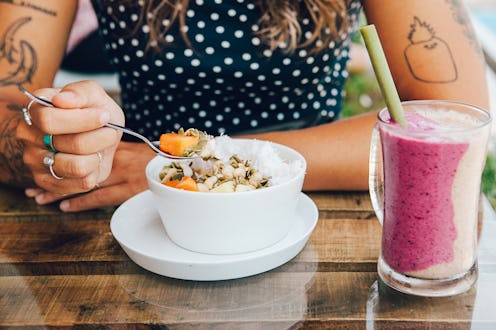(Living)
Food Vs. Supplement Probiotics — What Experts Say Is Best For You

Taking a stroll down the wellness aisle of your local supermarket, you'll probably notice there's a supplement for just about everything, from the promise of a more restful sleep to that of a strengthened immune system — and that's just the beginning. You also may or may not have noticed that many of these are isolated vitamins and minerals that are often incorporated into dishes you eat (or perhaps should be eating) on a regular basis, which begs the question: Is is better to eat it, or take it in capsule form? Take food-based vs. supplement-based probiotics for example. Which is best for you?
By now the importance of taking probiotics has long been established, considering that medical professionals have determined the value they have on your skin and gut health — and in turn your mental health, now that it's been proven there's a correlation between the two. Maybe you're getting your daily dose from yogurts and fermented foods or perhaps you've opted to ingest them in supplement form, purely out of ease. And while it may seem that there's no real difference — so long as you're getting them into your gut — nutrition experts believe one of these two ways is actually better for you, depending on your lifestyle needs and general health.
As for eating your probiotics, many medical professionals believe this is a preferable method, as it could offer additional benefits that result from a well-balanced diet. "Ingesting probiotics can be advantageous because you are able to consume additional micronutrients from the food that you choose," says emergency medicine physician Dr. Cassie Majestic. And registered dietitian Rachel Swanson agrees, noting that foods which contain beneficial microbes also typically offer micronutrients, phytochemicals, and fiber. "These compounds that exist within the food matrix have incredible synergistic effects in the body that cannot be replicated through supplementation alone," she explains.
But before you toss a ton of food items in your cart simply because their label touts them as "probiotic," both experts suggest there are some things to look out for when opting to take yours in edible form. "You need to ensure that the probiotic is still 'live' in order to get the benefits," says Dr. Majestic. "Some fermented foods undergo steps that remove the probiotics, so it is very important to check the label for indication of 'active cultures'." With that in mind, the physician recommends miso, tempeh, yogurt, and sauerkraut as a few of the easy-to-find sources of probiotic that can be added into your daily diet.
And Swanson stresses the importance of boosting the benefits of probiotics with crucial counterparts. "Think about the ecosystem of a rainforest; it’s incredibly diverse," she explains. "We want to preserve that same rich environment in our gut, too. Fostering this treasure of microbial diversity is accomplished by consuming a diverse amount of substrate — not just by eating probiotic-rich foods, but by including prebiotics and fiber-rich foods in our diet, too." As for foods that have naturally occurring prebiotics, the nutritionist recommends onion, garlic, unripe bananas, and Jerusalem artichokes.
While eating your probiotics is usually more preferable, Dr. Majestic notes there are some circumstances in which a supplement may be more practical, including a busy lifestyle, traveling, or limited access to nutritious foods. "Probiotic supplements can be an excellent option for individuals who are not able to ingest probiotics in their diet," she says. "It can be difficult to ensure you are consuming probiotics daily, given the limited foods that offer them. Add in a busy schedule, and it is easy to miss the opportunity entirely." In these cases, it may be additionally beneficial because it's easier to control the amount you're ingesting.
In either case, be sure to discuss your probiotic with your regular physician, as some people with sensitive guts (such as those with irritable bowel syndrome) can suffer from having too much. And as both experts recommend, an overall healthy and balanced diet is an important part of reaping the benefits of your preferred probiotic.
This article was originally published on